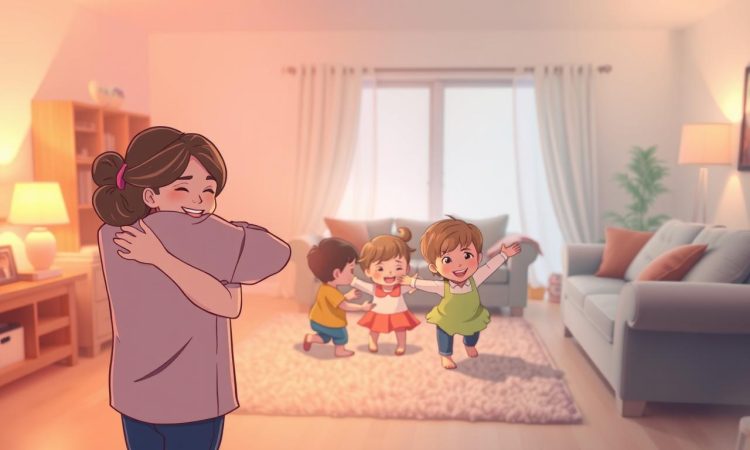
Is it better to stay in a troubled marriage for the sake of the children? This question weighs heavily on many parents. The decision to remain together or part ways can feel overwhelming, especially when kids are involved.
Parents often face a tough choice: maintain a stable family environment or seek personal happiness. Research shows that while a united family can provide security, an unhappy marriage may harm a child’s emotional well-being.
This article explores the emotional, legal, and practical aspects of this critical decision. We’ll share expert insights and real-world examples to help you understand the impact on your family. Let’s navigate this complex topic together.
On this Page:
Understanding the Emotional Impact on Children
Children are deeply affected by the emotional climate of their home. From a young age, they observe and internalize the dynamics between their parents. Even babies as young as six months can sense tension and conflict, which can shape their emotional development.
Research shows that kids in high-conflict homes often face long-term emotional challenges. Constant exposure to stress can lead to anxiety, depression, and difficulties in forming healthy relationships later in life. A peaceful environment, on the other hand, fosters security and emotional stability.
Research Insights on Child Well-Being
Studies reveal that parental conflict can have a profound impact on a child’s well-being. Kids who grow up in unstable environments are more likely to struggle academically and socially. They may also experience feelings of insecurity that persist into adulthood.
For example, research indicates that children from conflicted homes are 2 to 3 times more likely to develop emotional and behavioral problems. This highlights the importance of creating a nurturing relationship and a calm environment for kids to thrive.
Long-Term Effects of Parental Conflict on Kids
The effects of parental conflict don’t end in childhood. Many adults who grew up in high-stress homes report challenges in their own relationships. They may struggle with trust, communication, and emotional intimacy, often repeating the patterns they observed as kids.
Creating a positive environment for children isn’t just about avoiding conflict. It’s about fostering open communication, mutual respect, and emotional support. These elements can help kids build resilience and develop healthy relationships in the future.
Weighing the Pros and Cons of Marriage and Divorce
Deciding whether to remain in a marriage or pursue divorce is a deeply personal choice. It involves balancing the benefits of stability with the potential emotional costs of an unhappy relationship. This decision can shape not only your life but also the well-being of your children.
Benefits of Stability and Familiarity for the Family
One of the primary reasons parents consider staying together is to provide a stable environment. Familiar routines and a predictable family life can offer children a sense of security. This stability can help kids feel grounded, especially during challenging times.
Research shows that children thrive in consistent environments. A united family can foster emotional resilience and provide a strong foundation for their future. For many, this sense of continuity is worth preserving, even when the relationship is strained.
Drawbacks of an Unhappy Marriage on Emotional Health
While stability is important, an unhappy marriage can take a toll on everyone involved. Constant conflict and resentment can create a toxic atmosphere. Over time, this can lead to emotional harm for both parents and children.
Studies indicate that kids exposed to high levels of parental conflict are more likely to experience anxiety and depression. The quality of the marital relationship directly impacts a child’s ability to thrive. In some cases, separation may be the healthier option for the entire family.
Ultimately, the decision to stay or leave is complex. It intertwines emotional love with practical choices, requiring careful thought and consideration. By weighing the pros and cons, parents can make the best choice for their family’s long-term well-being.
Expert Insights on “staying married for the kids”
Understanding the role of professional guidance can shed light on complex family decisions. Psychologists and family counselors offer valuable perspectives that help couples navigate the emotional and relational challenges of their situation. Their insights can clarify whether remaining together truly serves the best interest of the children.
Perspectives from Psychologists and Family Counselors
Dr. Donna Matthews, a renowned psychologist, emphasizes that the quality of the parental relationship directly impacts a child’s emotional health. She notes that while stability is important, chronic conflict can harm a child’s development. Counseling can help couples assess whether their relationship fosters a healthy environment.
Dr. E. Mavis Hetherington, a leading family researcher, highlights that children often adapt better to a peaceful single-parent home than a high-conflict two-parent household. Her studies show that kids thrive when parents prioritize their emotional well-being over societal expectations.
Addressing Common Questions and Concerns
Many couples grapple with the question of whether staying together benefits their children. Experts suggest that open communication and professional guidance can help answer this. Addressing underlying issues, such as unresolved conflict or emotional distance, is crucial for making an informed decision.
Counselors often encourage couples to explore their reasons for staying together. Are they acting out of genuine concern for their children, or are they avoiding the challenges of separation? This self-reflection can lead to healthier choices for the entire family.
Real-World Examples and Research-Backed Insights
Research shows that children in high-conflict homes are more likely to experience anxiety and depression. On the other hand, kids in peaceful environments, whether with one or two parents, tend to develop stronger emotional resilience. These findings underscore the importance of prioritizing a nurturing atmosphere.
For example, studies indicate that children who witness effective conflict resolution skills are better equipped to handle their own relationships. This highlights the value of modeling healthy behaviors, whether parents stay together or separate.
Ultimately, expert advice can guide couples in determining the best path for their family. By focusing on their children’s best interest and seeking professional support, parents can make decisions that foster long-term well-being.
Navigating the legal and financial aspects of a relationship transition can feel overwhelming. These challenges often require careful planning and professional guidance to ensure the best outcome for everyone involved. Whether you’re considering separation or working to maintain a stable home, understanding these factors is essential.
Consulting with Divorce Attorneys and Family Lawyers
Seeking advice from a knowledgeable family lawyer is a critical step. These professionals can help manage custody arrangements, financial settlements, and other legal matters. Their expertise ensures that the interests of every person in the family are protected.
Legal guidance can also provide clarity on complex issues. For example, understanding child support laws or property division can reduce stress and confusion. A clear way forward often begins with professional support.
Assessing Financial Implications and Future Planning
Financial planning is another key aspect to consider. Separation or divorce can impact your finances for years to come. Creating a detailed budget and understanding your financial obligations can help you prepare for the future.
It’s also important to think about long-term goals. How will this transition affect your home and lifestyle? Planning ahead can provide stability and peace of mind during uncertain times.
By addressing these challenges with care and support, families can create a secure environment for everyone involved. A well-planned way forward ensures that both parents and children can thrive.
Strategies for Healthy Communication and Co-Parenting
Effective co-parenting can make a world of difference in your child’s life. When parents work together, they create a stable and nurturing environment that helps kids thrive. Whether you choose to stay together or separate, open communication and a unified approach are essential.
Creating a Positive Environment for Children
What truly matters is fostering a space where kids feel safe and supported. Consistency in routines and rules helps children know what to expect. This stability builds resilience and emotional security, even during challenging times.
Parents should focus on maintaining a positive outlook. Avoiding conflict in front of kids and modeling healthy behaviors can reduce stress. A peaceful home, whether with one or two parents, allows children to grow and flourish.
Implementing Effective Dialogues and Unified Parenting Plans
Open and respectful communication is the cornerstone of successful co-parenting. Discussing decisions together ensures that both parents are on the same page. This approach minimizes confusion and helps kids feel cared for.
Creating a detailed parenting plan can also reduce conflicts. Include schedules, responsibilities, and guidelines for major decisions. When parents collaborate, they show their children the value of teamwork and problem-solving.
Ultimately, the goal is to prioritize your child’s well-being. By working together, parents can create a life filled with love, security, and stability for their kids.
Conclusion
Making the right choice for your family’s future is never easy, but understanding the impact on your children can guide you. Whether you decide to stay together or part ways, the central goal remains the same: ensuring your children’s health and happiness.
Expert advice highlights that a nurturing environment, free from conflict, is key to their well-being. Seeking professional guidance can help you navigate this complex decision with clarity and confidence. Remember, even if you and your husband choose separate paths, both homes can continue to provide love and stability for your kids.
Ultimately, the journey to a healthier family dynamic is a shared one. Reflect on what choice best suits your unique situation, and prioritize your children’s emotional needs every step of the way.










